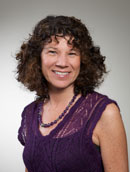 Professor Michelle Oberman joined the faculty in 2004 and is the Katharine and George Alexander Professor of Law. Her research focuses on health law, especially the legal and ethical issues surrounding adolescence, pregnancy and motherhood.
Professor Michelle Oberman joined the faculty in 2004 and is the Katharine and George Alexander Professor of Law. Her research focuses on health law, especially the legal and ethical issues surrounding adolescence, pregnancy and motherhood.
Why do you write?
To make sense of the world.
Is there a scholar who most inspires you?
A few folks who have in common the trait of staying curious and intellectually alive over time.
Stephanie Coontz, a sociologist of marriage, family and culture (although without a formal degree). She asks fresh, important questions, which she tries to answer in creative ways, and she always writes in a way that anyone might understand.
Dorothy Roberts, a scholar of race, gender and the law, whose work moves me as much for its substance as for the way it always seems to convey just the right balance of outrage and compassion.
Catherine MacKinnon, because of the audacity of her vision and the depth of her courage.
What do you think has been your most impactful work?
My first two op-eds on abortion in the New York Times (1, 2). It was a dream come true–writing something that felt urgently important, and having the good fortune to find an editor who agreed with me, and then helped me find my audience.
What impact did it have?
Because they drew on work I’d done over the preceding decade, I was able to credibly explain what does and does not happen when abortion is illegal. Of course, these pieces were just two of many that heralded the shifts brought on by the widespread availability of abortion medications, but I think the tone of these essays helped prod advocates on both sides of the abortion war to have different—and smarter–conversations when talking about abortion.
What work are you most proud of and why?
My work on abortion makes me feel most proud. I was fortunate to come to it relatively late in my career, at a point where I felt comfortable with my voice, as a writer, and was able to bring my full emotional self to the task.
What’s your next project?
I’ll be studying the impact of the abortion ban in a state that now bans abortion. My project involves interviews with health care providers, examining how the change in abortion’s legality impacts the care they are able to provide to their patients who are pregnant or capable of becoming pregnant.